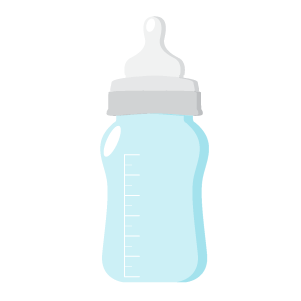
Though they are temporary, baby teeth are very important for the development of adult teeth and can help permanent teeth come in correctly. Baby teeth are necessary for your child to eat, speak and smile. It’s important to care for baby teeth just as diligently as adult teeth and establish positive oral health habits for your child early in their life.
Caring for your child’s baby teeth should begin as soon as they start to come in because they are susceptible to cavities. Tooth decay occurs when teeth are in contact with sugary food or drinks.
Nursing Bottle Syndrome, also called Baby Bottle Tooth Decay, is when a child’s baby teeth are in contact with infant formula, milk or juice. When these liquids remain in the mouth for a long period of time, teeth can decay rapidly. Baby Bottle Tooth Decay usually affects the top front teeth though it can occur throughout the child’s mouth. The name of this decay stems from one of the common causes; a child falling asleep with a bottle in their mouth. The liquid pools against the upper teeth as the child is sleeping and causes decay.
Tips to help prevent Early Childhood Caries and Baby Bottle Tooth Decay:
Never put sugary drinks like juice or soda in a baby’s bottle. It should be used only for formula, milk or water.
Don't put the baby to bed with a bottle or use a bottle to calm a fussy baby.
Don't share silverware with your child to avoid exposing them to your germs and/or any cavity causing bacteria.
Don’t dip a pacifier in sugar or honey before giving it to your baby, and don't use your mouth to “clean off” a pacifier or anything else that will go in your baby’s mouth.
After feeding your baby, clean their gums with a damp washcloth.
Once your child's teeth start to come in, begin brushing them with a smear (the size of a grain of rice) of toothpaste.
Call a dentist to determine when it’s appropriate to bring your child in for their first visit.
This information in this post is for general educational purposes only and does not warrant or represent any information as related to health as specifically appropriate for you. It is not intended to be medical advice or replace the relationship that you have with your health care providers. You should always seek medical advice on any diagnosis or treatment from a qualified health care provider. The information is provided “as is” without any representations or warranties, express or implied.





